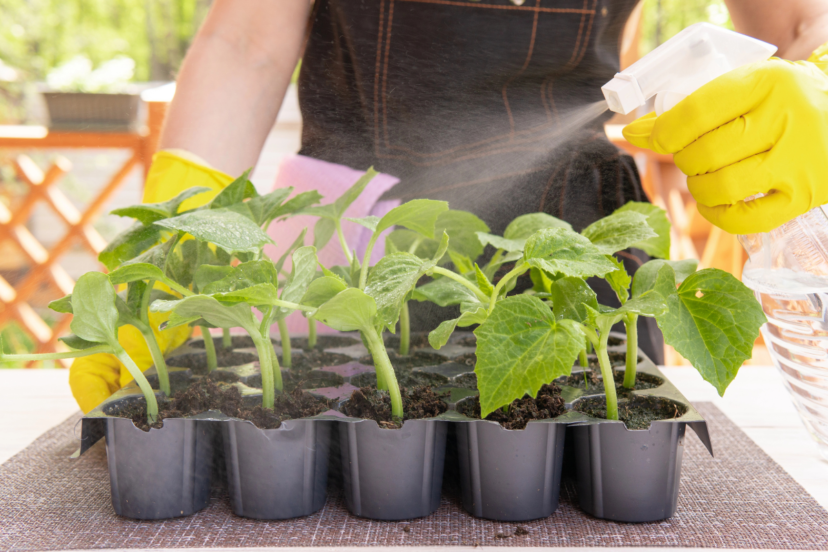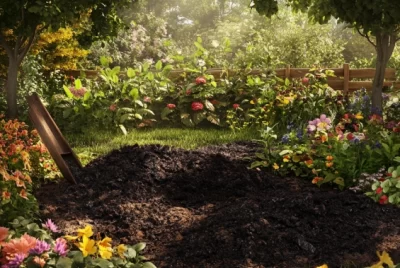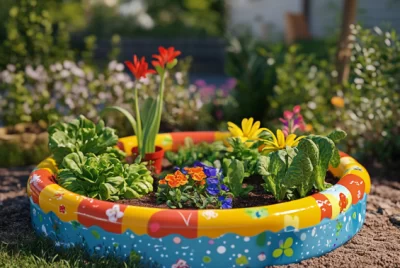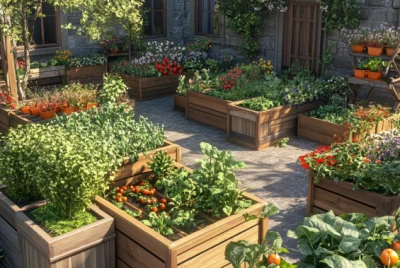Baking Soda Gardening: A Simple Fix for Several Issues
Baking soda gardening might sound like a new trend, but it’s a practice that’s been around for quite a while. When we think about baking soda, our minds often jump to baking fluffy cakes or perhaps even cleaning around the house. However, this versatile white powder can be a game-changer in your garden too. Today, I want to take you through how something as simple as baking soda can solve some of your biggest gardening challenges and benefit your green space in ways you might not have imagined.
Introduction
Gardening is a rewarding hobby but comes with its set of challenges. From pesky pests to fungal diseases, and even soil that just doesn’t seem right, there’s a lot that can go wrong. However, did you know that the solution to many of these problems might be sitting in your kitchen cupboard? That’s right—baking soda. This common household item is not just for baking or cleaning anymore; it’s also making waves in the gardening world. Baking soda gardening offers a plethora of benefits, from acting as a natural pesticide to helping balance soil pH levels. Let’s dive into how you can use this all-natural, budget-friendly tool to boost your gardening game.
The Basics of Baking Soda
Composition and Properties
Baking soda, or sodium bicarbonate, is a white powder with a slightly salty, alkaline taste. It’s known for its ability to react with acids and bases, which is why it’s so useful in baking. But these same properties also make it a powerful tool in gardening. Its natural, non-toxic nature means it’s safe for you, your plants, and even the critters you want to keep around in your garden.
History of Baking Soda Gardening
People have been using baking soda in their gardens for decades. It started as a home remedy for common plant problems and has since grown into a widely accepted gardening practice. Gardeners have passed down tips and tricks from generation to generation, proving that sometimes, the simplest solutions are right under our noses.
Benefits of Baking Soda in Gardening
Natural Pesticide
One of the most fantastic uses of baking soda is as a natural pesticide. It can help keep those annoying bugs away without the need for harsh chemicals. A sprinkle here and there, and you’ll notice fewer pests bothering your beloved plants.
Fungicide for Plants
Fungal diseases can wreak havoc on a garden. Thankfully, baking soda comes to the rescue once again. Mixing baking soda with water creates a safe, effective fungicide that can prevent and treat fungal growths on leaves and stems.
pH Neutralizer for Soil
Sometimes, the soil in our gardens isn’t quite right for the plants we want to grow. Baking soda can help adjust the pH levels of your soil, making it more neutral. This can be especially helpful if your soil is too acidic or alkaline for your plants to thrive.
In a nutshell, baking soda gardening is about taking advantage of this common kitchen ingredient to solve a variety of gardening problems. It’s safe, easy to use, and best of all, it’s environmentally friendly. So, whether you’re dealing with pesky pests, stubborn diseases, or just looking to give your plants a little boost, baking soda might just be the solution you’ve been searching for.
Practical Applications
Enhancing Plant Growth
Baking soda can help your plants grow stronger and healthier. A light dusting of baking soda on the soil around your plants can encourage blooming and reduce acidity, creating a more favorable growing environment. For example, sprinkling a small amount of baking soda in the water you use for tomato plants can sweeten the tomatoes.
Weed Control
Battling weeds can be a gardener’s biggest headache, but baking soda offers a simple and effective solution. By sprinkling baking soda directly onto weeds growing in the cracks of walkways and driveways, you can kill them without damaging nearby plants. The baking soda will dehydrate the weeds and make them easier to remove.
Cleaning Garden Tools
After a long day in the garden, your tools can get pretty grimy. Baking soda is great for cleaning and deodorizing garden tools. Simply make a paste with baking soda and water, apply it to your tools, scrub, and then rinse off. This not only cleans the tools but also prevents rust, keeping them in good condition for longer.
Innovative Uses of Baking Soda in Gardening
Keeping Pests Away
Baking soda can deter certain pests without harming your plants or the environment. Mixing baking soda with flour and sprinkling it around your garden can keep rabbits and other critters from munching on your vegetables and flowers. It’s a humane, non-toxic way to protect your garden.
Freshening Up Walkways and Patio Areas
Algae and moss can make garden paths and patios look unsightly. Sprinkling baking soda on these areas and then spraying them with vinegar can clean and clear these surfaces without the need for harsh chemicals. This method ensures your garden looks neat and tidy, enhancing the overall aesthetics of your outdoor space.
Tips and Tricks
Correct Dosages for Different Applications
While baking soda is a versatile and safe product, using the right amount is crucial to avoid harming your plants. Generally, a solution of 1 tablespoon of baking soda mixed with 2 liters of water is safe for most gardening applications. Always test the solution on a small area before applying it broadly to ensure it doesn’t adversely affect your plants.
Safety Precautions
It’s important to remember that too much baking soda can be harmful to plants. Being a salt, it can cause dehydration and nutrient imbalances if overused. Use it sparingly and only where needed to ensure the health and vitality of your garden.
Baking soda gardening is a testament to the power of simple, sustainable solutions in our pursuit of a thriving garden. By incorporating baking soda into your gardening routine, you can tackle a wide range of issues naturally and effectively. Whether you’re a seasoned gardener or just starting, baking soda can be a valuable addition to your gardening toolkit, helping you grow a healthier, more beautiful garden without relying on harsh chemicals. So next time you’re in your garden, remember that this humble kitchen staple could be your secret weapon for gardening success.
As we’ve seen throughout this exploration of baking soda gardening, this simple kitchen staple can play a significant role in maintaining and enhancing your garden. From its initial use as a natural pesticide and fungicide to its ability to adjust soil pH and even clean your gardening tools, baking soda is as versatile as it is effective. But before we wrap up, let’s touch on some success stories and the lessons we can learn from them, solidifying the impact baking soda can have on our gardening practices.
Conclusion
In wrapping up our journey into baking soda gardening, it’s clear that this unassuming white powder is a powerhouse in the garden. We’ve covered its benefits, from pest control to pH regulation, and explored practical applications that can make a real difference in your gardening endeavors. We’ve also touched on innovative uses that extend beyond plant care, demonstrating baking soda’s versatility and effectiveness in a wide range of gardening scenarios.
The beauty of baking soda gardening lies in its simplicity and sustainability. It’s a reminder that sometimes, the best solutions are the most straightforward ones. By incorporating baking soda into your gardening routine, you’re choosing a safe, eco-friendly approach to tackle common gardening challenges. Whether you’re dealing with stubborn weeds, seeking to enhance plant growth, or aiming to maintain clean and rust-free tools, baking soda can help you achieve your gardening goals without relying on harsh chemicals.
Remember, the key to successful baking soda gardening is balance. Use it wisely, and let it complement your other gardening practices. With a little bit of baking soda and a lot of love, your garden can thrive, becoming a testament to the effectiveness of natural, sustainable gardening solutions.
So, the next time you’re in your garden, facing the usual challenges, remember that a solution might just be a pantry staple away. Happy gardening, and here’s to the many successes you’ll find with baking soda by your side!
FAQs on Baking Soda Gardening
Can baking soda harm plants?
Yes, while baking soda is generally safe for use in gardens, it can harm plants if used excessively. Being a type of salt, baking soda can cause dehydration and nutrient imbalances in plants if applied too liberally. It’s important to use it sparingly and test it on a small area before widespread application.
How often can I use baking soda on my plants?
It’s recommended to use baking soda solutions on your plants no more than once a week. This frequency ensures that you’re providing enough benefit to tackle issues like pests or fungus without overwhelming your plants with too much sodium bicarbonate.
Is baking soda effective against all types of garden pests?
Baking soda is effective against a range of garden pests, particularly those that dislike its alkaline nature. However, it’s not a one-size-fits-all solution. Some pests may not be deterred by baking soda, and in those cases, alternative methods may be needed.
Can I use baking soda to improve the taste of my vegetables?
Yes, in some cases, lightly sprinkling baking soda on the soil around certain vegetables, like tomatoes, can help reduce acidity, potentially improving their taste. However, this effect can vary and it’s important to use baking soda cautiously to avoid altering the soil’s pH too drastically.
How do I make a baking soda fungicide spray?
To create a baking soda fungicide spray, mix 1 tablespoon of baking soda with 2 liters of water. You can also add a teaspoon of liquid soap to help the mixture adhere to plant leaves. This spray can be used to treat and prevent fungal diseases on plants. Always test the spray on a small portion of the plant first to ensure it doesn’t cause damage.




